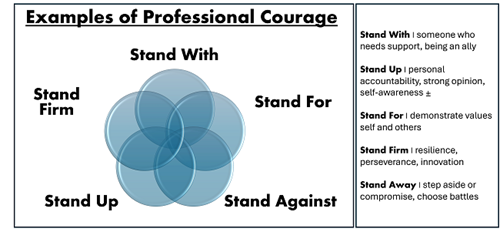Are you courageous?
The new Global Internal Audit Standards call for internal auditors to “tell the truth and do the right thing, even when it is uncomfortable or difficult.”
But what exactly is professional courage?
And have you got it?


Courage is a key attribute of a successful leader. When applied well and consistently, it inspires others. When used inappropriately or avoided, it can create risk, damage morale and negatively impact the reputation and influence of the leader and their function.
Put simply, internal audit leaders must be courageous to do their job.
According to the Chartered Institute of Personnel and Development professional courage encompasses the ability to:
- Challenge decisions and actions
- Advocate for change
- Take a stand when necessary
- Acknowledge mistakes and learn from them
- Be on the side of ethics, morality, and fairness even when faced with resistance or opposition.
All core behaviours for internal auditors.
But for CAEs, courage is more than this. It sets the cultural tone for the organisation. It is leading by example with key stakeholders – internal auditors, the executive, the board and the audit committee.
The Standards say that demonstrating integrity includes “having the courage to act based on relevant facts, even when facing pressure to do otherwise, or when doing so might create personal or organizational consequences.”
For a CAE getting it wrong might mean an untenable relationship with the CEO, the need to resign to maintain ethical principles, or being dismissed and battling for a compromise agreement.
But that’s the extreme. It is possible to be professionally courageous, enhance your reputation and pay your mortgage.
It is about making informed decisions that avoid career-ending consequences.


A great example of courage (stand with) is calling out behaviour, process or policy that is a barrier to inclusivity – especially where protected characteristics are concerned. Audit leaders also have the opportunity to demonstrate courage (stand up) by playing devil’s advocate in discussions to raise opposing or sometimes unpopular perspectives to encourage debate.
Courage is a topic we will explore in detail, including ethical principles and emotional intelligence, during 2024 and beyond as it is the bedrock of being a valued internal audit function, raising the bar of the profession and Standards conformance.
Here are three practical insights to get started.
- Decision-making
- Social Capital
- Muscle Memory
Decision-making
The Standards are clear. Courage is not reckless. It is based on relevant facts.
What is your decision-making process? Does it have rigour?
Have you audited it? How do you balance anecdotal evidence with hard facts?
Being courageous carries a degree of risk. Self-awareness is important to ensure you don’t overthink or rely on gut feel. A key mitigation to avoid negative consequences is to ensure your decisions are evidence-based. Validate sources. Be sure of the facts.
Social Capital
Social capital is the positive outcome of human interactions. Examples include information, ideas, opportunities or actions.
Building and using your peer network enables your courage to flourish.
The independence of a CAE can make it a lonely role so use trusted peers as a critical friend to debate when and how to act.
A strong network builds confidence and provides support when necessary.
Together you will inspire one another to be the best CAEs you can be.
Muscle Memory
Like any behaviour. Courage needs to be practised.
Muscles need exercise to strengthen and the same is true of courage.
Doing the ‘right thing’ can be tough. But with a training plan and dedication a non-runner can go from walking around the local park to completing a marathon. And you can be courageous.
Doing the ‘right thing’ also builds credibility, rapport with others and confidence. The ‘right thing’ is about positive, constructive action. It is critical that CAEs avoid personal agendas, conspiracy theories and inquisitions!
Closing thoughts
Professional courage is the backbone of a CAE – and it is fragile. The Chartered Institute is here to support you and stretch your capabilities - not push you beyond your limits. Take a moment to look again at the examples of courage in the earlier diagram – have you missed an opportunity to Stand With someone – are you strong enough to Stand Up when the need arises?
“Courage is what it takes to stand up and speak; courage is also what it takes to sit down and listen”
Winston Churchill